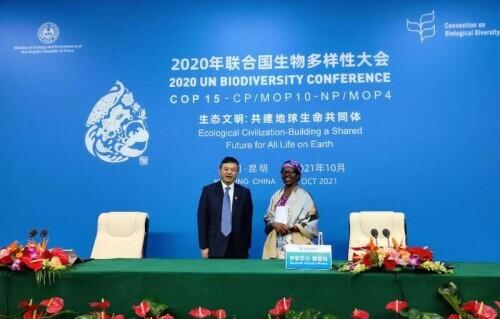Kunming, October 15 (China Youth Daily) -- Today, the first phase of the fifteenth meeting (COP15) of the Conference of the Parties to the United Nations Convention on Biological Diversity came to an end, and in the view of Elizabeth Murema, Executive Secretary of the Secretariat of the United Nations Convention on Biological Diversity, a series of meeting results laid a successful foundation for the holding of the second phase of the meeting.
At tonight's press conference, Huang Runqiu, chairman of COP15 and minister of China's Ministry of Ecology and Environment, said that the conference stood at the "crossroads" of protecting biodiversity and achieving high-quality development of mankind, condensing broad political will, forming a strong political driving force, and forming both ambitious and balanced and pragmatic results.

On October 15, Huang Runqiu, Minister of Ecology and Environment, and Elizabeth Murema, Executive Secretary of the Secretariat of the United Nations Convention on Biological Diversity, exchanged views and took a group photo after the press conference. China Youth Daily, China Youth Network reporter Zhang Yi/photo
Huang Runqiu said that the Kunming Declaration reached at the COP15 high-level meeting is a landmark outcome of the Conference, providing political guidance for the follow-up global biodiversity consultations and injecting new impetus into the determination and willingness of countries to take action to ensure that biodiversity is on the road to restoration by 2030 at the latest. At the same time, the "Jointly Building a Global Ecological Civilization and Protecting Global Biodiversity" initiative released by the COP15 Ecological Civilization Forum has also played a positive impact. At the same time, a series of pragmatic and powerful measures taken by China as the host country have also attracted the attention of the international community, especially the establishment of the Kunming Biodiversity Fund with a capital of 1.5 billion yuan.
In Murraema's view, COP15 is worth noting that people are already in action. In fact, in the last decade, the "Aichi Targets" committed to the Parties to the Convention on Biological Diversity to work towards mitigating the loss of biodiversity had not been met.
In Murreima's view, this is due to the time lag between commitment and actual action, and by the time many countries started taking measures, three or four years had passed. Before the COP15 meeting, there were already organizations that decided to spend $5 billion to support biodiversity governance in the next decade, and the EU also increased the support funding for biodiversity conservation from 5.5 billion euros to 6 billion euros; at the high-level meeting of COP15, a number of leaders introduced the positive actions that their countries have taken.
How can global biodiversity loss be reversed by 2030? Murraema believes that the most important thing is to break the past pattern of biodiversity governance in which one group or sector fights alone. The governance of biodiversity requires the participation of different actors across borders and across sectors. Full and effective participation of indigenous peoples and local communities, women, youth, civil society, local governments and authorities, academia, business and the financial sector, as mentioned in the Kunming Declaration, and other relevant stakeholders.
Source: China Youth Daily client